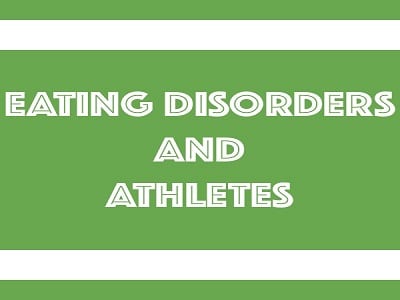Eating disorders are serious but treatable mental illnesses that affect people of all genders, ethnicities, ages, religions, sexual orientation, body shapes, and weight. Approximately 20 million women and 10 million men in the U.S. will suffer from an eating disorder during their lifetime. Studies find eating disorders are more prevalent in athletes than in the general population.
Without treatment, an eating disorder can be fatal. Every 52 minutes, at least one person dies from complications related to their eating disorder, according to the National Association of Anorexia Nervosa and Associated Disorders (ANAD) statistics.
Although there is no specific cause of eating disorders, experts believe biological, psychological, and sociocultural factors all play a role. Individuals diagnosed with an eating disorder often have co-occurring anxiety or depressive disorder.
Athletes and Eating Disorders
Sports participation promotes physical conditioning, athletic ability, and fair play, but also carries inherent stressors. Most athletes experience an unrelenting pressure to perform, and, depending on the sport, may feel additional pressures related to physical appearance.
Although male athletes also experience eating disorders, they are more common in female athletes and more common in sports that encourage a certain appearance, body size, or shape.
National Eating Disorder Association (NEDA) statistics cite a study of Division I NCAA athletes finding “over one-third of female athletes reported attitudes and symptoms placing them at risk for anorexia nervosa.” Anorexia and bulimia are the most common eating disorders found in both athletes and non-athletes.
People with anorexia typically have dangerously low body weight, a deep fear of gaining weight, and a distorted body image. They severely restrict the amount of food they eat, sometimes to the point of starvation.
Those with bulimia may secretly binge on large amounts of food then purge to rid the body of calories. Individuals with either disorder may use unhealthy methods of expelling unwanted calories by vomiting, using laxatives or diuretics, excessive exercise, or other methods.
Risk Factors For Athletes
According to NEDA, athletes are at a higher risk for developing an eating disorder if their sport emphasizes appearance or weight, focuses on individual performance rather than team performance, or is an endurance sport. Sports in these categories may include gymnastics, bodybuilding, diving, wrestling, figure skating, dance, track, and field, running, and swimming.
Other risk factors may include:
- Training for a sport for many years, often since childhood
- Excessive pressure by family members to excel in a sport
- Having an academic scholarship dependent on sports performance
- Low self-esteem or anxiety disorder
- Family history of eating disorders
- History of trauma, including sexual or physical abuse
- Coaches or trainers who push performance at all cost
Coaches and parents can play a vital role in helping identify and prevent eating disorders in athletes. See the NEDA Coach and Trainer Toolkit to learn how to spot an eating disorder, how to minimize the risks of developing an eating disorder, and how to help athletes with an eating disorder find help.
Turning Point of Tampa has been offering Licensed Residential Treatment for Addiction, Eating Disorders and Dual Diagnosis in Tampa since 1987.



